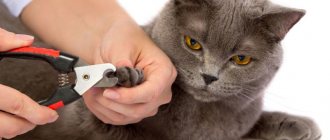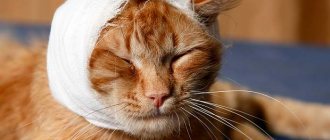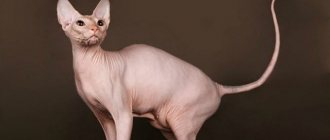Tips to help you brush your cat's teeth at home.
Cats occupy the first positions in the lists of the most beloved pets. Agree, it’s nice when this purring face comes to you and expresses its feelings in the cutest way. However, cats, like any other animal in principle, bring not only joy and tenderness, they also cause a lot of trouble. After all, any living creature needs constant care, moreover, proper care must be provided and exactly the kind that each specific animal needs. Today we will talk about oral hygiene in cats and figure out how to adhere to it.
Do cats and kittens need to brush their teeth?
Before answering the question: “Do cats need to brush their teeth?” Let's talk a little about dental diseases of these animals and their causes.
The oral cavity of cats is not much different from the human oral cavity.
- A person, unlike an animal, can independently take care of himself and his hygiene, moreover, he can do this to the required extent
- The animal cannot brush its teeth or seek dental care on its own. Despite this, cats' teeth are no less susceptible to disease than human teeth.
- It must be said that there are several factors that, one way or another, influence the development of dental diseases in pets:
- Insufficient care of the animal and its teeth
- Food the animal eats
- Previous infectious diseases
- Misaligned teeth
- The presence of harmful bacteria that negatively affect the microflora of the oral cavity
- Predisposition
- Insufficient care of the animal and its teeth
Brushing a cat's teeth
Now let's pay a little attention to those diseases that appear in cats precisely because of improper and insufficient oral care:
- Plaque. Plaque is the first enemy of cat teeth. What is a raid? Plaque is food debris, saliva and, of course, bacteria. The plaque can be gray, white or yellow. Why is it so important to ensure that your animal’s teeth are free of plaque? It's very simple - the formation of plaque causes other, more serious problems with teeth
- Tartar. Tartar is precisely the more serious problem that arises as a result of ignoring plaque. The plaque becomes hard and forms stone deposits in which thousands of bacteria happily live and multiply. With such an illness, seeking help from a veterinarian is mandatory, because ignoring this problem will at least lead to tooth loss
- Caries. This disease affects not only people, but also animals. In simple terms, caries is tooth decay.
- Osteomyelitis of teeth. The cause of this serious illness is untreated caries or an infection in the oral cavity. The disease manifests itself as suppuration on the gums
The list of dental diseases in cats can be continued for quite a long time, but there is no point in it. So, what, in fact, was all the above information brought to? And besides, the cause of all these diseases, as a rule, is improper oral hygiene.
Is it worth answering the question now: “Do cats need to brush their teeth?” Remember, oral hygiene should be carried out for almost all pets and cats top this list.
What is tartar
Tartar in cats is dental plaque in which calcium salts have been deposited and have undergone mineralization. Initially, plaque appears on the teeth, which is a film of food residues and microbes. These microbes, in turn, feed and multiply, causing inflammation of the gums. All this leads to a change in the composition of saliva and mineralization (hardening) of dental plaque. It is believed that 7-10 days are enough for the mineralization process to occur, that is, plaque becomes tartar.
How to properly brush your cat’s teeth at home: tips
People understand very well the importance of this procedure, so, as a rule, even a small child does not have any difficulties when brushing their teeth. However, animals are not given the opportunity to understand that brushing their teeth is a necessary procedure for them.
Often cats do not like to brush their teeth and, of course, try in every possible way to prevent their owner from doing so. That is why it is very important to know how to clean the animal’s mouth correctly and painlessly for him.
So, let's look at how to properly perform dental hygiene on a cat:
- Of course, you should start by placing the cat in a position that is comfortable for you. This does not mean that you can put him on his back and press him to the sofa, no. You need to take the pet either with its face towards you or away from you, depending on how comfortable it is for you. In the process of brushing its teeth, the animal will, of course, struggle and scratch, so outside help will be very helpful. So, we’ve decided - you hold the cat, lightly holding its jaw, and your assistant holds the paws
- By and large, the animal does not understand what is happening to it, so do not increase its stress. Do not immediately take a brush with toothpaste and thoroughly brush your teeth. Start small. For example, you can clean the oral cavity and teeth in several stages: first the front teeth, and a little later all the rest. It is important to remember that you need to take very little toothpaste, otherwise the cat will simply eat it.
Cleaning cat teeth at home
- The correct way to brush your teeth is when you apply a minimum of effort. Remember that your pet's teeth are slightly different in size and shape from yours, and accordingly, you should brush them a little differently too.
- You should not torment the animal for a long time; movements should be fast, but not sharp, and without pressure
- The entire procedure should ideally take about a minute, but no more. In principle, with regular cleaning, about 30 seconds will be enough.
- The procedure should be completed by wiping the animal’s gums and teeth with a regular cotton wool or sponge, which must first be moistened in warm water.
Prevention of tartar formation in cats
The basis for preventing problems with your cat’s teeth is a systematic examination by a dentist (once every 6-8 months). In the early stages, it is easier to solve the problem by preserving the maximum number of teeth. In advanced cases, it is necessary to remove 10 or more teeth per procedure. Also, as a preventative measure, you can give specialized food that will mechanically load the teeth: the granules of such food are large and have a special texture; they do not break when squeezed, but are compressed. It is also advisable to systematically brush your animal’s teeth at home.
Author of the article: veterinary dentist Snitka Ekaterina Sergeevna
Which toothpaste and brush should I use to clean my cat's teeth?
Choosing a brush and paste for an animal is a responsible matter. The fact is that cats' gums are very vulnerable.
- When choosing a brush for an animal, you should definitely give preference to a special one. Why can't you use a regular toothbrush? Because it will be too hard for the animal and can easily damage the soft tissues in the mouth
- As a last resort, you can use a regular baby brush, but this option can be used as a last resort, but not on an ongoing basis.
- The most popular are brushes that fit on your finger. Most people consider this option the most convenient, however, when using such a brush, it is important to remember safety measures, because the animal will have every chance of biting you
- As for the paste, it should also be intended specifically for the animal. The taste of mint, lemon, lemon balm or honey that a person loves will not be to the liking of a cat. The taste of meat, fish or other delicacy for an animal is a completely different matter.
- By the way, there is another way to brush your pet’s teeth. To do this, you can use a piece of cloth or just your finger instead of a brush. Of course, this method cleans the animal’s teeth much worse, but sometimes owners use it. If you still decide to try this method, then you need to take a small piece of clean, moderately hard fabric and wrap it around your finger. Next, apply a little paste to the fabric and carry out the procedure in accordance with the algorithm described above.
How to teach a kitten to brush its teeth?
It will be no secret to anyone that it is much easier to train a small kitten to regularly brush its teeth than an adult cat. In this case, everything is completely similar to how this process is taught to a small child, of course, with the exception of explanations of the importance of this procedure and its necessity.
- Of course, you shouldn’t start brushing the teeth of a kitten that has just opened its eyes. However, you shouldn’t delay this procedure either.
- As soon as your fluffy ball starts feeding on its own and gets a little comfortable in this world, you can begin to accustom it to oral hygiene
- First, let the kitten “get acquainted” with the brush and toothpaste. Let him examine these objects, perhaps play with them. This is necessary so that the animal does not see potential danger in these things.
- Begin the procedure in such a way that the cat receives minimal stress
- For the first time, you can brush only your front teeth and even without using toothpaste.
- For the 2nd time, add a little paste and brush only the front teeth in the same way.
Brushing a kitten's teeth
- If the kitten reacts more or less normally, then you can increase the number of teeth brushed
- If the animal reacts too violently to the procedure, then the brush can be replaced with a finger for a while
- Once your pet understands that brushing their teeth is not a painful procedure, it will become much easier.
- Remember, initially you don’t need to go deep into your mouth, this can cause discomfort, including vomiting
- You also don't need to brush your teeth for too long. For the first time 15-20 seconds. will be more than enough
- Another piece of advice is that such procedures should be carried out no more than once a week.
- The main thing is desire and patience - if you adhere to all the above recommendations, then after 5-10 procedures your fluffy will be happy to brush his teeth
How often should you brush your cat's teeth?
We humans are accustomed to brushing our teeth at least once a day. For us, this is quite acceptable, if not mandatory. However, animals do not need such frequent teeth cleaning.
- In principle, it will be quite enough for a cat if its teeth are brushed 1-2 times a week.
- However, if you have the desire and opportunity, the procedure can be performed much more often - 3-5 times a week
- It is also worth paying attention to the following points:
- You brush your teeth, but your pet's mouth smells bad
- Despite oral hygiene, the cat has visible plaque on his teeth
- Your pet's teeth have changed color and tartar has appeared
Proper brushing of a cat's teeth
All these symptoms indicate that the procedures you are performing are ineffective or insufficient. If plaque forms, perform oral hygiene more thoroughly and more often.
If an unpleasant odor is added to the plaque, pay attention to the animal’s diet; it may need to be adjusted. If stones are found on the teeth, cleaning the oral cavity alone is no longer enough. In this situation, you need to take your pet to the vet.
Causes of tartar in cats
The causes of tartar in cats are:
- Lack of mechanical stress on the teeth (animals that eat only wet and soft food encounter this problem at an earlier age);
- Chips of enamel, injuries to teeth (in this case, the cat experiences pain when trying to chew food (treats) on the side where there is a problem tooth, and, as a result, the teeth stop being cleaned);
- Changed composition of saliva and the presence of a large number of microorganisms in the oral cavity;
- Genetic predisposition (cats with a short skull are more likely to have dental problems than normal cats because their jaws are shorter and their teeth are more crowded and it is easier for food particles to accumulate between them);
- Lack of hygienic cleaning (the most favorable prognosis is for cats whose owners manage to systematically clean their pets’ teeth);
- Resorptive damage to the roots of teeth (a disease characterized by the destruction of enamel in the cervical part of the tooth. All cats are susceptible to this disease, and, unfortunately, the disease cannot be cured).
So, the cat has a stone on its teeth. It becomes covered with a new portion of plaque, then microbes, and mineralizes again, that is, it grows. Increasing in size, plaque begins to compress, injure and push back the gums, causing inflammation. Bacteria found in the stone and on the gums increase inflammation, which subsequently spreads to the tissue around the tooth (periodontitis). The tooth becomes mobile, after which it is no longer possible to save it.
What bones should you give cats to clean their teeth?
In addition to traditional methods of brushing your teeth, you can also use alternative ones.
- Let's start with special dental toys. Special bones come in different scents and are used to clean teeth from plaque.
- You can also give cats regular edible bones. However, you need to take into account the breed of the pet, its age and the condition of its teeth. Very often, cats do not gnaw bones, but simply swallow them, and this, as is known, leads to digestive problems
- Cats can be given bones, which are sold in pet stores. Such delicacies most often consist of tendons, joints and crushed bones
- Large bones with some meat left on them. The bones must be large so that the animal cannot eat them and chew them into small pieces
- Remember, cats should not be given tubular bones. You should also not feed your pet sharp bones, because they can easily damage not only the animal’s oral cavity, but also its internal organs. Even if the bones easily enter the stomach, they can cause digestive problems
- Regular dry food also cleans teeth well, but if your pet has not consumed it before, then consider the need to use this particular method of brushing teeth.
Bones for cleaning teeth
Cats are purring antidepressants, which, perhaps, are in every home. As you can see, in addition to joy, they can bring quite a lot of trouble. However, such chores are even a joy for a truly loving owner. Teach your pet to oral hygiene from childhood - and then you will not encounter possible difficulties in the future.











